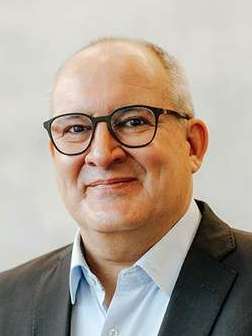Michael Böcher

Prof. Dr. Michael Böcher
Session: Circular Society - Research at the Interface of Technology, Societal Support and Individual Appropriation
Title: Bioeconomic Solutions
for Sustainability? Institutions
and Political Conflicts as
Important Driving Forces
for Bioeconomy Policy
Michael Böcher has held the Chair of Political Science and Sustainable Development at Otto-von-Guericke-Universität Magdeburg since 2016. He studied political science at Philipps-Universität Marburg, where he received his diploma in 1997 and received his doctoral degree from Georg-August-Universität Göttingen in 2008. Here he worked as a research assistant and research group leader until 2015. He then moved to the Department of Policy Analysis and Environmental Policy at the FernUniversität in Hagen, before accepting the professorship at Otto-von-Guericke-University in 2016. His main areas of research are bioeconomy, environmental and climate politics and policy, Regional Governance, the role of expertise for public policy and scientific knowledge transfer. Michael Böcher’s work has been published in several books and in high ranked peer reviewed journals like, amongst others, the Journal of Public Policy, Environmental Politics, Journal of Environmental Policy and Planning, Ambio, Biological Conservation, Land Use Policy, Forest Policy and Economics. He has advised institutions like the Federal Environmental Agency Germany, the Federal Agency for Nature Conservation Germany, and the Austrian Federal Ministry of Education, Science and Research. He has served as a reviewer for national and international research programmes and has lead or co-lead several third-party funded research projects. Michael Böcher has been a member of the Bioeconomy Council of the German Federal Government since 2020.
Bioeconomic Solutions for Sustainability? Institutions and Political Conflicts as Important Driving Forces for Bioeconomy Policy
The contribution deals with the role of the bioeconomy in achieving the sustainability goals from a political science perspective. The bioeconomy plays a key role, for example, for the European Green Deal and the achievement of EU climate neutrality by 2050. In Germany, too, the National Bioeconomy Strategy is intended to make an important contribution to climate protection through bioeconomic solutions. In addition, more than 50 countries around the world have now adopted their own bioeconomy strategies. Based on research on German and EU bioeconomy policy, this contribution shows that these programmatic goals are in contradiction to actual policy. On the one hand, there is no coordinated, integrated bioeconomy policy at all; on the other hand, institutional paths and actor conflicts shape the practical implementation of concrete bioeconomy solutions. On the one hand, conflicts emerge between economy and ecology that has long been observed in environmental policy. On the other hand, however, new conflicts arise when actors demand access to biomass that was previously reserved for more traditional sectors such as forestry, due to novel technical solutions such as biosourced chemicals. This is illustrated by concrete examples from the fields of bioenergy, bioplastics and, more generally, the wood-based bioeconomy.

